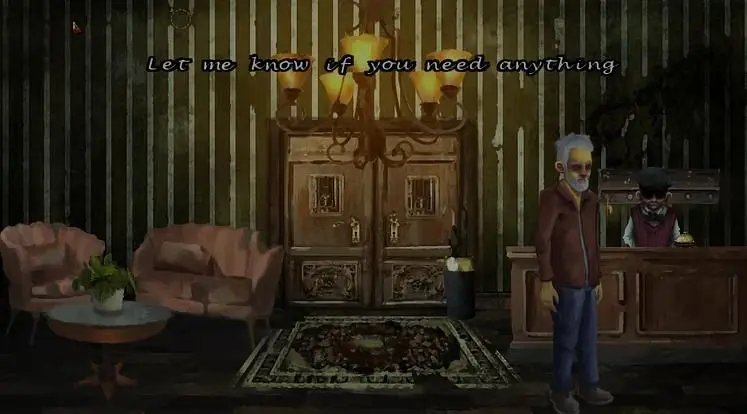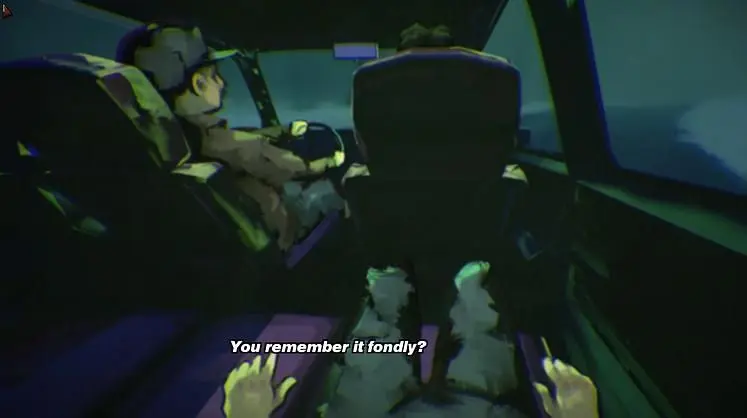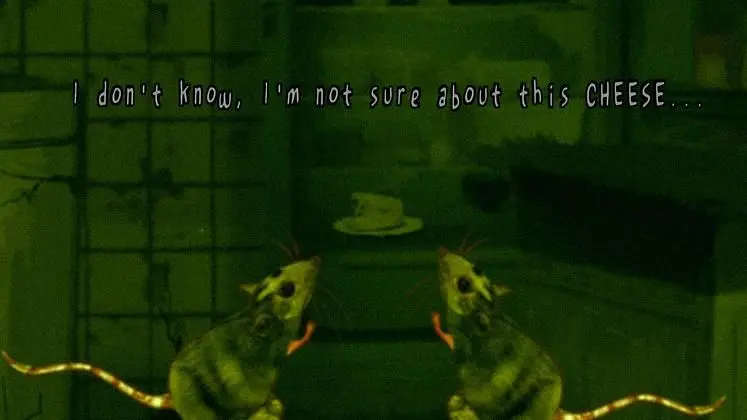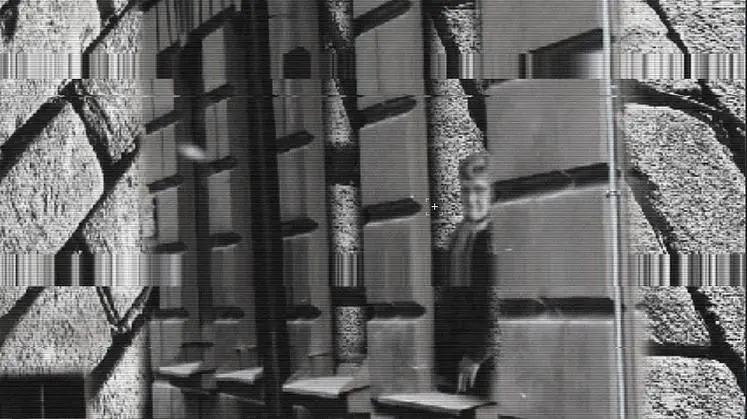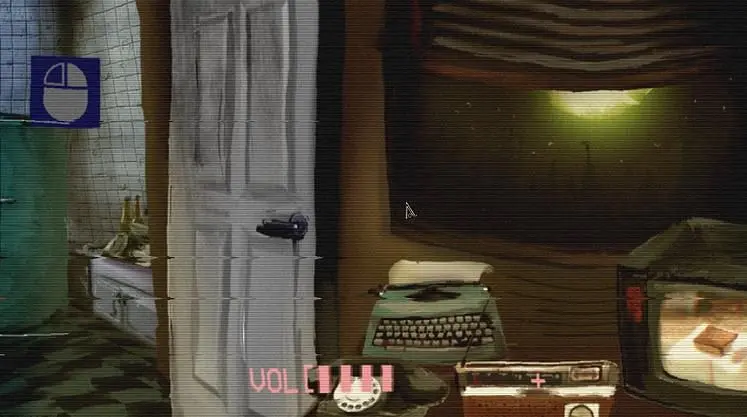Concierge’s opening moments find its older, unassuming protagonist waking up in his small hotel room. The fierce blizzard raging outside fills the silence between the four walls, rattling the sole wooden window.
Upon pulling back the curtains, the snow more closely resembles pieces of popcorn plummeting towards the earth. The notebook hanging on a drawer next to the bed contains entries expressing anticipation for a premiere, a past brush with death, and a familiar dream, yet most of its pages remain unreadable.
Eschewing a detailed introduction or bombastic hook, Concierge relies on your own curiosity to push you towards discovering its rather distinct brand of weirdness. It hopes that you’ll take the initiative to inspect the objects in your room, spot the key to your door, and set off to explore the hotel and figure out how and why the man ended up there, or perhaps something else entirely.
It plays like a traditional point-and-click adventure game, the left mouse button acting as the main way to interact with most things in the game world. The right mouse button backs out of menus and enables the use of a camera found early on, which detects clues that your humble human eyes cannot spot. Move the mouse arrow to the top of the screen and your inventory temporarily drops down, letting you pick up any items you might have collected along the way.
On the surface, the hotel seems to be your usual establishment and certainly a welcome sight for anyone looking to take shelter from rough weather. After leaving my room and moving past a series of numbered doors, I’m drawn to the distant, almost ghastly sound of old-timey music.
Taking the elevator, I discover a silent gramophone before I meet the concierge, who speaks to me in gibberish soundbites rather than an actual human voice. His speech is accompanied by a viola playing a classical theme interwoven with electronic music elements.
Later on , droning noises keep me on edge as I venture forth, but there are also moments in which the protagonist’s sole companion is the sound of his own footsteps, making the world feel like it suddenly shrinks to highlight his solitude in this place that houses the inexplicable and the surreal.
Concierge’s painterly visuals revel in having their colors and shapes muddled yet still depict its world in familiar, appropriately messy detail. They might take some getting used to, but unquestionably give the game character.
The notebook in the protagonist’s room – structured as a recounting of a play in several acts – is the only semblance of narrative glue I found during my short stay at the hotel. The more you progress, the more you make sense of its scribbled pages. There seems to be a story there, although I’m not sure yet how the protagonist fits into the broader picture.
The atmospheric bouts of exploration require careful observation since, while some items are obviously placed in the foreground, other clues – whether that be a key used to unlock a numbered door or a set of numbers visible only when using your trusty camera – wait patiently to be discovered.
Unveil them, solve enough puzzles, and you’ll be rewarded with cryptic, unsettling bits of visual and audio or even stranger minigames. Of the latter, I encountered my first after returning to my room and catching a glimpse of a sad child staring through my window. One unexpected transition later, I was looking at a series of old photographs, having to spot the people in them.
Finding one person yielded a new picture to analyze. Sometimes, only the figures changed positions. Distorted bars and visual artefacts then started blocking parts of the photographs. Even further on, multiple photos moved across the screen, requiring that I pay extra attention to find their subjects, who rarely stood front and center or in the foreground.
There was a time limit – suggested through audio cues that increased in rhythm the closer it got to depleting – but the only penalty for failing, if any, seemed to send me back to the previous photo.
Upon completion, I was rewarded with a first-person cutscene-style sequence in which a man – presumably the protagonist – conversed with his driver. Moments later, I was back in my room and could read a new page in the notebook.
A second minigame involved drowning out invasive sources of sound – allegedly caused by some sort of malevolent entity – by using the “good” sounds of a fridge, car, or by tapping on a nearby TV and adjusting the frequency of a radio.
Stuck in my chair, I could, holding the right mouse button, shut doors and windows to keep shadowy figures at bay when they came for me. There is a surprising amount of tension that borders on horror to this exercise – and you’re actually offered tips if you fail repeatedly – but, even so, in the latter stages, it becomes a little too overwhelming, so I didn’t get to see what waited beyond.
Although I can certainly appreciate the lack of handholding while exploring the hotel – which fits thematically – I did also inevitably get stuck, spotting some clues that were likely how I could push forward, but never quite knowing what to do with them.
What do the shifting symbols seen through the camera’s lens when pointing it at the oven glass mean? Why is there an endless loop in the basement and how can I break it? Part of me still wants to find answers to these questions, but even within the short time I spent with the game, I did wish for a hint system that at least suggested what to look for next when I got stuck.
I enjoyed how Concierge made me feel during its bizarre portions more than figuring out the solutions to its puzzles. I was surprised to hear the concierge speak in weird soundbites, only to listen to actual voices in a later cutscene. I was caught off guard by the notion that a malevolent force would take over my mind by making bottles clank rhythmically.
I laughed when I could hold it back by simply closing doors, as I did when intruding upon two rats discussing whether or not taking an intact piece of cheese back to their lair was worth the risk and the impact on one’s reputation for not doing so. Repeatedly exploring the same rooms and hallways in hopes of spotting new clues became old much, much quicker.
Concierge’s store page explicitly describes it as a challenging game, remaining adamant about its lack of tutorials, so perhaps it’s simply one for the most perseverant explorers. From the small slice I played for this preview, I can’t yet say whether the payoff is worth it.
It’s clear to me, however, that Concierge is a decidedly niche game that’s made for point-and-click-adventure fans who prefer a slower burn of a story laden with plenty of weirdness and cryptic elements. If that happens to be you, joining its protagonist during his stay at this particular hotel might just prove unsettlingly refreshing.
Concierge arrives on PC, via Steam, on September 17, 2025.
